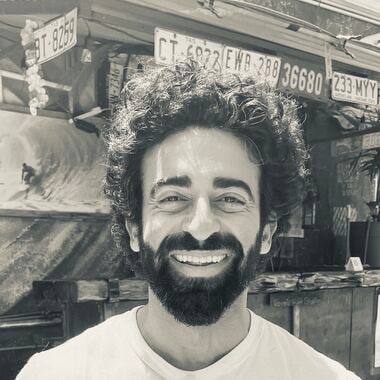Your experience as a teacher really forces you to be a fantastic time manager. You really have to figure out what you need to do, how you're going to do it and execute. And that's a skill set that you can utilize anywhere you go. My name is Abbas Manji. I am a 2009 New York City corps member. Personally, as a co-founder of an education technology company, I'm using these skills every day. In fact, it allows me to operate almost at 130, 140 percent capacity just because I know that you know, my day is generally booked with meetings, decision-making meetings, strategy meetings. And it's really difficult generally for most folks to code-switch. There's a mental toll that takes switching from one task to another. And I think teaching really helps you develop the skill set in order to switch effectively and efficiently and get on doing what you need to do.
I majored in finance, moved to New York, and sought out to be an investment banker. Except the moment I became an investment banker, I realized I had made a horrible mistake and I hated helping rich people get richer. So after two years, I joined Teach For America, and as a high school math teacher serving students, the system dubs at risk, but really, I would say the system has to service those students. And in that time, I ended up writing a lot of my own curriculum because there just wasn't a really good curriculum available at the time in New York City. And I developed some of my own asynchronous and synchronous learning tools. No one was using these terms, by the way, back then. And ultimately that led to a partnership with my co-founder now at the organization known as Kiddom, which is a paradigm-shifting education technology company, distributing high-quality core curriculum. I'm a co-founder there, I’ve been running Kiddom for eight years now. I wouldn't have been able to do that without my experience as a high school math teacher and wouldn't have gotten to be a high school math teacher if it wasn't for Teach For America.
I met Keyshawn my first year as a teacher, and Keyshawn, he is incredibly sharp and brilliant. We are still in touch today. We are friends now. He has challenged me and I have challenged him. And I was the first person he came out to. And, you know, we had a good cry and I think creating safe spaces are really important for kids.
Back when I was teaching, there was a dearth of high-quality core materials. Today we call it HQIM, high-quality instructional materials, and there's a whole movement about it. But back then, this was just a budding movement through the open educational resource movement, and that was spurred by teachers who wanted to find great materials and who were tired of using standardized textbooks, which didn't necessarily allow students to have mirrors and windows into themselves and connect with the content. Part of the reason why we're able to do this is because we just don't want teachers to spend so many hours of their day looking for resources by the time they get done traversing the Internet, scanning for resources, you know, they're tired. They have to grade, they have to evaluate student performance and then they still need to conduct all the admin work that is required of teachers. And then somehow they still need to gather enough energy to connect with and inspire kids. And to be able to support and facilitate excellent learning experiences and create discourse-driven environments that takes energy and time. One of the reasons why I'm glad to have gone through the Teach For America program, I have learned how important it is for high-quality core materials to really be developed through the lens of equity so that all students are positively impacted. And it's an honor to be working at Kiddom to be able to do that work.
